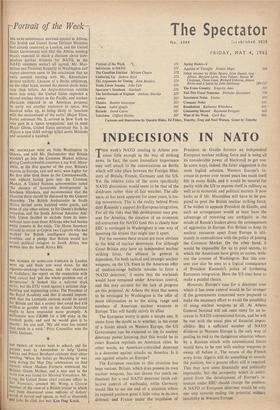INDECISIONS IN NATO
For the moment these strains are most obvious in the field of nuclear deterrence. For although Great Britain may have an independent nuclear striking force, the alliance in general is dependent, for both tactical and strategic nuclear weapons, on the US. Even in the American offer of medium-range ballistic missiles to form a `NATO deterrent,' it seems that the warheads would have remained under American control, and this may account for the lack of progress on this proposal. At Athens the most that seems to be envisaged by Washington is the offer of more information as to the siting, range and numbers of American nuclear weapons in Europe. This will hardly satisfy its allies.
The European worry is quite a simple one. It stems from the doubt as to whether, in the event of a Soviet attack on Western Europe, the US Government can be expected to use its nuclear deterrent power knowing that this would be to court Russian reprisals on American cities. In other words, an American-controlled deterrent is a deterrent against attacks on America. Is it one against attacks on Europe?
The European reaction to this situation has been various. Britain, which does possess its own nuclear weapons, has not shown too much en- thusiasm for a real NATO deterrent (with col- lective control of warheads), while Germany would like to see the end of a situation where its exposed position gives it little voice in its own defence; and France under the impulsion of
President de Gaulle favours an independent European nuclear striking force and is using all its considerable power of blackmail to get one. In some ways, indeed, the latter suggestion is the most logical solution. Western Europe's in- crease in power over recent years has made itself felt in many fields, and it would be natural for parity with the US to express itself in military as well as in economic and political matters. It now looks as if Mr. Macmillan will have to be pre- pared to pool the British nuclear striking force, if he wishes to appease President de Gaulle, and such an arrangement would at least have the advantage of removing any ambiguity in the minds of Russia's leaders about the consequences of aggression in Europe. For Britain to keep its nuclear resources apart from Europe is ulti- mately in contradiction with the policy of joining the Common Market. On the other hand, it would be impossible for us to pool secrets, to which the Americans have given us access, with- out the consent of Washington. But this con- sent can also be seen as a logical consequence of President Kennedy's policy of furthering European integration. Here the US may have to make a painful choice.
However, Europe's case for a deterrent over which it has some control would be far stronger if the governments concerned were prepared to make the necessary effort to avoid the possibility of using nuclear weapons at all. At Athens General Norstad will ask once more for an in- crease in NATO conventional forces, and he will be met with the usual plea of financial impos- sibility. But a sufficient number of NATO divisions in Western Europe is the only way of putting an end to the dangerous situation where- by a Russian attack with conventional forces would have to be met with nuclear weapons or sweep all before it. The return of the French army from Algeria will do something to remedy the position, but a greater effort still is required. This may now seem financially and politically impossible, but the prosperity which is antici- pated from the development of Europe's re- sources under EEO should change the position. A NATO or European deterrent would be only one step towards ending the potential military instability in Western Europe.






































 Previous page
Previous page